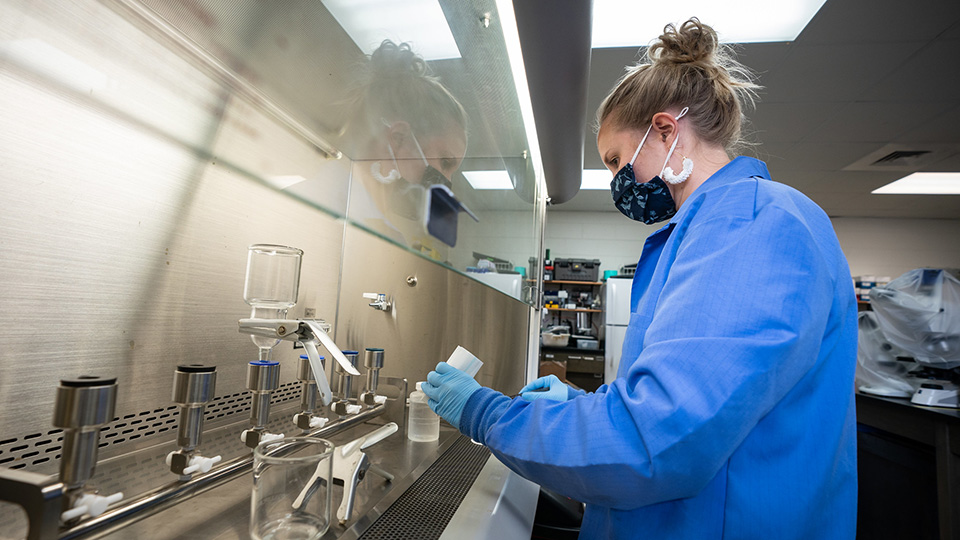In another effort to catch potential on-campus outbreaks of COVID-19 before they happen, the Environmental Research and Innovation Center (ERIC) at the University of Wisconsin Oshkosh soon will regularly test residence hall wastewater for evidence of the virus.
“Wastewater testing has historically been a useful tool for the early detection of other diseases,” said ERIC lab manager Carmen Thiel. “Monitoring the dorm wastewater on the UW Oshkosh campus for the presence of COVID-19 will assist University and Oshkosh area health officials in public health decision making, as COVID-19 can be shed in the feces of both symptomatic and asymptomatic people.”
ERIC is a certified laboratory for both chemical and biological contaminants. As a lab that already processes and analyzes samples of various matrices including wastewater, the lab is fully equipped and staffed to handle samples of public health importance. The ERIC lab already is testing sewage at a handful of local healthcare facilities for the same purpose.
Wastewater testing of the 10 residence halls housing students this fall is planned to begin shortly. It’ll not only benefit the University, it could be a tool to prevent future spread in the Oshkosh community and beyond.

Greg Kleinheinz
The results from the wastewater testing will be an additional piece of data available for University officials keeping a close eye on the spread of COVID-19 among the UWO community—especially the nearly 2,300 students living on campus.
“The results from the wastewater testing will be another way to monitor the prevalence of the virus on campus and, along with the daily testing, are another data point we can use to make decisions on how to continue to keep the UWO community safe,” said UWO Police Chief Kurt Leibold, chair of the Titans Return Implementation Team.
ERIC director and environmental engineering technology professor Greg Kleinheinz said these tests will give UWO officials a general idea of how much COVID-19 is in each residence hall, and swift action can then be taken if needed. It’s not a strategy to find specifics on the number of cases in a building.
“We’ll get a relative abundance—is it high, low, is there any?” Kleinheinz said. “That’ll help kind of drive what happens next. If all of a sudden after several tests with no virus, then a huge spike and a big number arrives, it won’t tell you how many people are infected but it can give you an indication that a number are, or just one or two.”
Tests will be run once or twice a week to start, Kleinheinz said, but the plan is flexible moving forward. The ERIC lab will collect and process the samples, then send them off to a private lab for analysis. Results will be available within three days.
“UW Oshkosh is fortunate to have the ERIC lab as a testing resource on campus,” Thiel said.
Sewage testing for COVID-19 has been on the rise in recent weeks, especially on college campuses. UW-Madison also is conducting these kinds of tests, Kleinheinz said.
The University of Arizona announced last month it likely prevented an outbreak in a residence hall thanks to an early red flag in wastewater and an immediate response of tests and quarantines. University of Idaho made a similar claim this week.
For more information on the steps taken by UWO to keep students, faculty and staff safe during the pandemic, visit the Titans Rise website.
Learn more:

